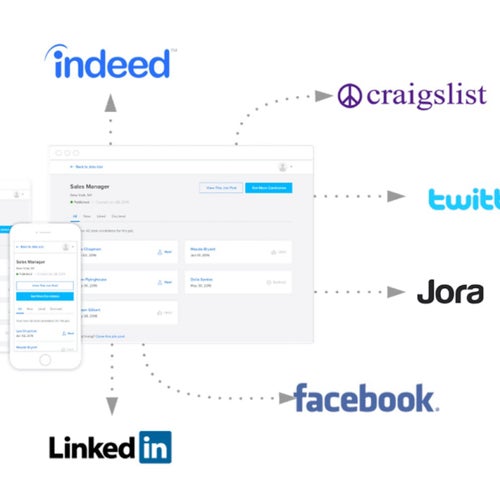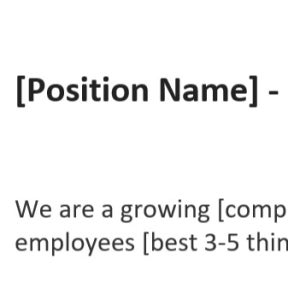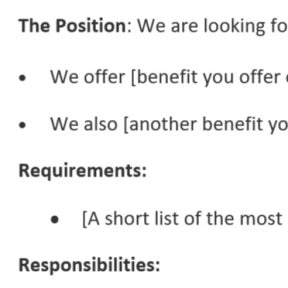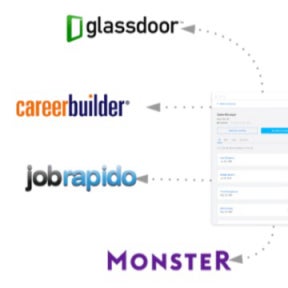How to Advertise a Job:

A step-by-step guide on how to advertise your vacancy, from evaluating your hiring needs to screening and pre-selecting candidates for the interview process.
Get prepared to hire.
Assess your needs.

Determine what your current hiring needs are. This means identifying what you are looking for in a new recruit and the number of positions you want to fill. You'll also want to set a budget for your hiring activities and identify a date when you will ideally want your new recruit to start so that you can create a hiring timeline.
Write a job description.

Before writing a job ad, you will need to have a detailed job description that clearly defines what the position entails and identifies the required skills and experience.
The purpose of a job description is two-fold. The human resources department uses job descriptions to define and manage employees' performance, remuneration, and benefits. It is also used externally to accurately describe the vacancy.
Create a road map.

There are different channels you can use to advertise a job vacancy. Do some research and find out which are best suited to your target audience and budget. You may want to include your company's internal communication channels, your company website and social media accounts, as well as industry networks and external job posting sites.
Before sharing your job ad, you'll also want to decide on a method for candidates to apply and how you will manage the applications you receive. To save time and streamline your application and interview processes, consider investing in an applicant tracking system (ATS).
Be sure to check whether any of your company's current software applications include an ATS.
Create a job posting.
Start with a great title for your job ad.

If you want to target the most appropriate candidates, you will need to write a job ad that is clear and direct, starting with a simple but attractive job title. Avoid getting too creative with the name of the position as you want candidates to easily find your job ad and instantly identify if it is relevant to them.
In the title, include up to three things that make the position attractive. Keep it short and to the point.
Introduce the job and your company.

In the introductory paragraph, provide a short but emotive overview of what successful applicants can look forward to at your company, including the most appealing aspects of the job. Here, you'll want to sell the position and get candidates interested and excited about the prospect of joining your company.
Describe the role, requirements, and what you offer.

Using the job description as a guide, write up all the relevant information about the role, such as the type and level of the job, the duties, and a list of requirements. Don't forget to add information such as work hours, remuneration, growth opportunities, perks, and benefits, along with anything else that candidates will find interesting.
Remember to customize your job advert with language and information that your target audience will identify with.
Advertise the position.
Advertise internally.

Once you have a killer job advertisement, you may want to send it out to your staff, customers, and business liaisons first. One of your staff members may be suitable for the role or know someone who is. Your business partners will also have a large candidate database that you can tap into with a well-worded email and job description.
Post on your company website.

Posting your job ad on your company website is an excellent way to attract interested candidates that may be actively looking for a position in your industry and at your company. You can also add structured data to your job postings to ensure that your advertisement is indexed by Google for Jobs.
Advertise on job boards.

Advertising on job boards is by far the most effective way to attract qualified candidates. There are free and paid options available, depending on the type of posting you want, the reach, and the duration of your advertisement.
Many job boards also give you the option of creating a company profile and browsing resumes from candidates actively seeking positions in your industry.
Top job boards for fast hiring:
- Indeed — free & paid options.
- Monster — from $12.00 /day.
- CareerBuilder — from $349.00 /mo.
- Jobvertise — free & paid options.
- Craigslist — from $10.00 /post.
- Snagajob — from $89.00 /post.
- Wellfound — free & paid options.
- Nexxt — from $199.00 /mo.
- CareerBliss — free & paid options.
Depending on your industry, there may be niche job boards and industry-specific career and information portals you can use to reach a highly defined target audience.
Top job boards by industry:
- Aerospace job boards.
- Advertising job boards.
- Banking job boards.
- Call center job boards.
- Data entry job boards.
- Executive job boards.
- Farming job boards.
- Healthcare job boards.
- Hospitality job boards.
- Logistics job boards.
- Marketing job boards.
- Mining job boards.
- Restaurant job boards.
- Retail job boards.
- Telecommunications job boards.
- Veterinary job boards.
Post on social networking sites.

Posting your job ad on Facebook, LinkedIn, and other social networking sites is another great way to reach qualified candidates. Make sure you update your company profiles regularly and remain active online — this will ensure people follow your page and check in regularly for job openings.
Screen applicants and start the selection process.
Review applications.

Once you start receiving applications, you will need to filter out any that don't meet your must-have requirements, such as specific skills, work experience, and educational background. You can use resume parser software to help you speed up this process.
Screen candidates.

Once you've filtered out applications that don't meet the essential criteria, you can screen the remaining candidates by sending an email with a few screening questions or scheduling a short phone interview to go over the basics and get an idea of whether you want to get to know them better.
If the number of applications is still quite large, you may want to opt for screening emails to save time.
Interview candidates.

Having screened your applicants, you can now go on to perform background checks and conduct interviews to find the best person for the job.
For more guidance, see our articles on creating an interview process and hiring your first employee.


